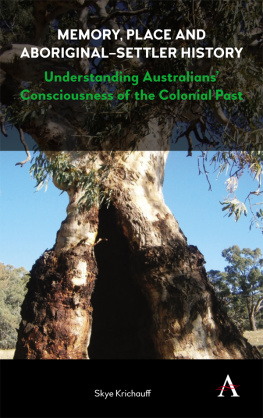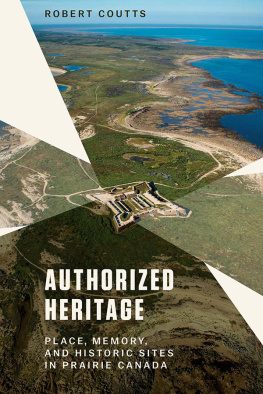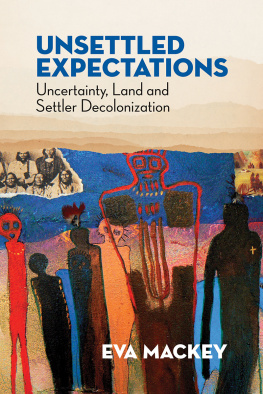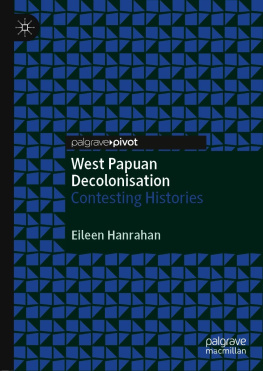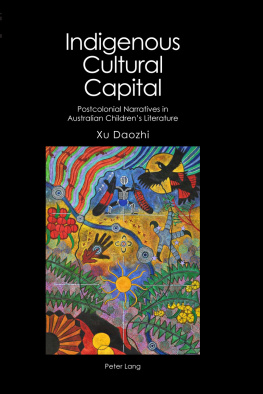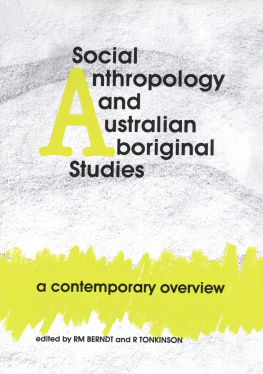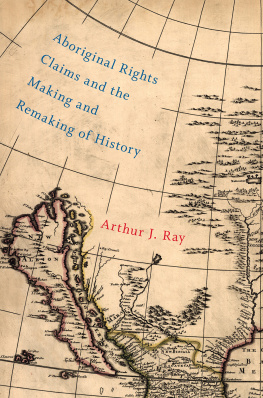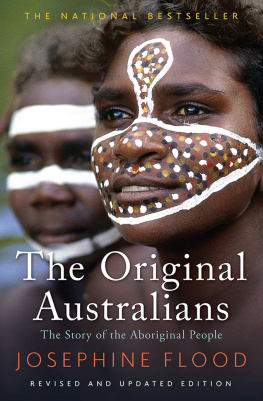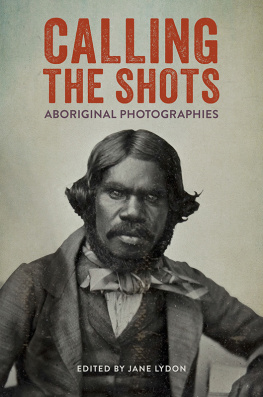Memory, Place and AboriginalSettler History
Anthem Studies in Australian History
Anthem Studies in Australian History publishes new and innovative scholarship in Australian history, including work that is concerned with how the legacies of the past resonate in contemporary Australia. The series aims to showcase research in the Indigenous, social, cultural, political, media, environmental and economic histories of Australia. This includes Australian scholarship on the historical dimensions of visual and material cultures as well as relevant work in heritage, museum and memory studies. The series is particularly focused on approaches that locate the histories of Australia in broader postcolonial, transnational or comparative contexts, and examine Australia in the Asia-Pacific region and the world.
Series Editor
Kate Darian-Smith University of Melbourne, Australia
Editorial Board
Tracey Banivanua Mar La Trobe University, Australia
Frank Bongiorno Australian National University, Australia
Anna Clark University of Technology, Sydney, Australia
Martin Crotty University of Queensland, Australia
Bridget Griffin-Foley Macquarie University, Australia
Anna Johnston University of Queensland, Australia
Jane Lydon University of Western Australia, Australia
Chris McAuliffe Australian National University, Australia
Amanda Nettelbeck University of Adelaide, Australia
David Nichols University of Melbourne, Australia
Maria Nugent Australian National University, Australia
Fiona Paisley Griffith University, Australia
Keir Reeves Federation University, Australia
Penny Russell University of Sydney, Australia
Anja Schwarz University of Potsdam, Germany
Simon Sleight Kings College, London
Agnieszka Sobocinska Monash University, Australia
Memory, Place and AboriginalSettler History
Understanding Australians Consciousness of the Colonial Past
Skye Krichauff

Anthem Press
An imprint of Wimbledon Publishing Company
www.anthempress.com
This edition first published in UK and USA 2017
by ANTHEM PRESS
7576 Blackfriars Road, London SE1 8HA, UK
or PO Box 9779, London SW19 7ZG, UK
and
244 Madison Ave #116, New York, NY 10016, USA
Copyright Skye Krichauff 2017
The author asserts the moral right to be identified as the author of this work.
All rights reserved. Without limiting the rights under copyright reserved above, no part of this publication may be reproduced, stored or introduced into a retrieval system, or transmitted, in any form or by any means (electronic, mechanical, photocopying, recording or otherwise), without the prior written permission of both the copyright owner and the above publisher of this book.
British Library Cataloguing-in-Publication Data
A catalogue record for this book is available from the British Library.
Library of Congress Cataloging-in-Publication Data
Names: Krichauff, Skye, author.Title: Memory, place and Aboriginalsettler history: understanding Australians consciousness of the colonial past / Skye Krichauff.Description: London, UK; New York, NY: Anthem Press, 2017. | Series: Anthem studies in Australian history | Includes bibliographical references and index.Identifiers: LCCN 2017020559 | ISBN 9781783086818 (hardback : alk. paper) | ISBN 1783086815 (hardback : alk. paper)Subjects: LCSH: South Australia Colonization Historiography. | South Australia Race relations Historiography. | Aboriginal Australians, Treatment of Australia South Australia Historiography. | Pioneers Australia South Australia Historiography. | Frontier and pioneer life Australia South Australia Historiography. | Historiography Social aspects Australia South Australia. | Memory Social aspects Australia South Australia. | Place attachment Social aspects Australia South Australia. | Reconciliation Social aspects Australia South Australia. | Whites Australia South Australia Interviews. | BISAC: HISTORY / Social History. | HISTORY / Australia & New Zealand. | SOCIAL SCIENCE / Anthropology / Cultural.Classification: LCC DU322 .K74 2017 | DDC 305.899/1509423dc23LC record available at https://lccn.loc.gov/2017020559
ISBN-13: 978-1-78308-681-8 (Hbk)
ISBN-10: 1-78308-681-5 (Hbk)
The publication of this project has been assisted by grants from the Historical Society of South Australia and the South Australian History Fund

This title is also available as an e-book.
To those, past and present, whose land was taken over, and to those, past and present, who acted with decency and saw the humanity in others
CONTENTS
Appendix 1:
Appendix 2:
Appendix 3:
How do people know or, more poignantly, make sense of events that precede their own lives? How are experiences passed down through the generations and how does knowledge of our forebears experiences affect our understanding of both broader historical events and the world in which we currently live? What can be gained by distinguishing between different ways the past is known, for example, the past known through memory (by recalling an event, place or person that has been actually experienced) and the past known through abstract means (such as through lectures, books, information boards)? These are some of the rather vague and general questions I have grappled with while trying to understand how societies live with historical injustices or, more particularly, how non-Aboriginal Australians know, make sense of and relate to the historical injustice of Aboriginal dispossession.
Throughout my childhood and adolescence I was completely ignorant about the Aboriginal people who belonged to the land my forebears occupied in the 1870s and on which I grew up. It was not until I was at university in the early 1990s that I began to learn how Europeans came to be in this country. This newly acquired knowledge shook me and made me question everything I thought I knew about the world in which I lived. I was shocked and sickened: at the injustice and manner of the original owners dispossession; that our whole society, our whole legal and parliamentary system, was based on such a fundamental, massive immoral act which no one seemed to speak about; that I had remained completely unaware of this for the first 20 years of my life and had never had any cause to question or think about European presence here; that when I told others what I had recently learned, no one seemed particularly interested.
The general lack of discussion and concern about how Europeans came to be here which prevailed in Australia throughout much of the twentieth century has, in certain ways, been superseded. Now, in the twenty-first century there is greater awareness and acknowledgement of the violence of European occupation and the multifaceted injustices Aboriginal people suffered and continue to suffer as a result of colonialism. The walk for reconciliation in 1988, the history wars of the 1990s and 2000s, the Mabo decision and legislative recognition of Native Title, Prime Minister Kevin Rudds apology to the Stolen Generation, all signal that the nation as a whole is more alert and sensitive to our problematic history. There are now laws, policies, councils and committees to promote reconciliation between Aboriginal and non-Aboriginal people. But while this may make some Australians more alert and sensitive to some aspects of Aboriginalsettler history, it does not necessarily translate into a widespread understanding or empathy for Aboriginal suffering, or to non-Aboriginal Australians making the connection between the violence of the past, the fundamental injustice of dispossession and their own lives.

